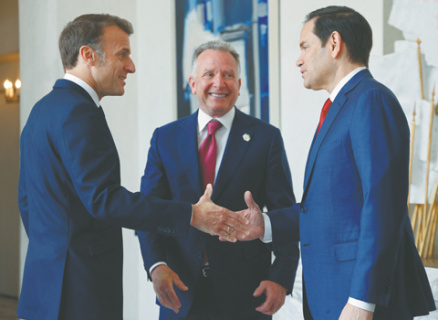
An American delegation has arrived in Paris, including Special representative of the US President Steve Witkoff, who is responsible for contacts with the Kremlin in Donald Trump’s team, and Secretary of State Marco Rubio. During this mission, in addition to discussing the currently difficult relations between the White House and European allies, the topic of ending the conflict between Russia and Ukraine will be touched upon. After all, as Moscow is signaling, not only peace, but even a truce is impossible without easing the sanctions pressure of both the United States and the EU.
Strictly speaking, French President Emmanuel Macron and his team hosted several foreign delegations on Thursday, April 17. There were representatives of the “coalition of the willing” – countries that, after the truce, agreed to send troops to Ukraine. These are Assistant for National Security to British Prime Minister Jonathan Powell and Assistant for National Security to German Chancellor Jens Pletner. They, along with Macron’s adviser Emmanuel Bonn, held talks on Thursday morning with the Ukrainian delegation, which includes Ukrainian Foreign Minister Andriy Sibiga, Defense Minister Rustam Umerov, and head of the presidential office Andriy Ermak. The Ukrainians also planned to meet with Witkoff and Rubio, as well as with Trump’s special representative for Ukraine, Keith Kellogg, who arrived with them. The latter’s powers are limited to contacts with official Kiev. The US press, in particular The Wall Street Journal, citing sources, reports that Kellogg, who was supported by Rubio, has his own idea of what concessions are acceptable in relation to the Russian Federation. Allegedly, he is trying to convince Trump to act tougher towards the Kremlin. The fact remains that Witkoff is communicating with the leadership of the Russian Federation, and as both Moscow and Washington keep emphasizing, this communication has not disappointed either side yet.
The authorities of Ukraine and the EU, on the contrary, are very wary of Witkoff’s contacts. He says publicly that the peace agreement will provide for Kiev’s renunciation of five or four regions, although it is unclear in what form (this number varies from statement to statement). Finally, following his talks, including with Vladimir Putin, the Western press had a clear impression that the Russian Federation was making the easing of Western sanctions an indispensable condition for a truce. It is Western, not just the United States. The resumption of the grain deal, which provides for the unhindered transit of Ukrainian and Russian grain through the Black Sea, provides for the connection of at least one bank of the Russian Federation to the SWIFT system, which has its headquarters in the EU. Meanwhile, earlier, the European allies of the United States, with the exception of Hungary, denied the very idea of lifting any sanctions from Russia.
The Macron administration said that immediately before Thursday’s talks, the French president spoke on the phone with Ukrainian President Volodymyr Zelensky. This alone indicates that a result is expected from the Rubio and Witkoff mission in Europe.
It is also important in the context of the tariff war between the EU and the USA. It started unexpectedly and was just as unexpectedly put on a 90-day pause. Initially, the introduction of tariffs was suspended by Trump, then the European Commission announced its intention to postpone the introduction of retaliatory measures. Negotiations on what to do next are proceeding along two tracks. Rubio spoke about tariffs in Paris, and Italian Prime Minister Giorgia Meloni discussed them with Trump in Washington. Before his visit to France, the Secretary of State did not state that the tariff war and Ukraine could be interrelated topics. However, the assumption that the United States will try to use duties as a method of pressure on the EU in order to make the Europeans more compliant on the issue of the truce is already obvious. Trump has repeatedly made it clear that he views tariffs as a kind of miracle weapon with which to achieve any concessions. He threatened to use it against Russia as well. Trump, we recall, promised to impose secondary duties on Russian oil – a punishment not for individual companies, but for countries that buy Russian energy resources. How feasible this threat is in practice remains an open question. Nevertheless, it sounded like that from Trump. He promised to introduce secondary duties if peace could not be negotiated.
Recall that the deadline has been named, by which it is very desirable for Trump to achieve some kind of result in the negotiations on Ukraine, is Easter, April 20. The visit of Witkoff, Rubio and Kellogg will last until April 18. Thus, it turns out that this is the final attempt to achieve any result before the date set by Trump.
* * *
The discussions on how to reach an agreement with the Russian Federation were also monitored by Russian Telegram channels.
“Donald Trump, as the BBC noted, has made a new attempt to hit global trade by targeting shipping related to China. The initial plans included the introduction of harsh taxes on ships entering U.S. ports under the pretext of “reviving American shipbuilding.” Not only Chinese ships were to be hit, but also any companies building or using ships from Chinese shipyards. However, after a barrage of criticism from businesses that predicted a crisis, the White House significantly softened its position, and the final decree turned out to be much less decisive than expected,” Temnik writes.
The authors of the Mouse in the Vegetable channel recall the recent call by the head of European diplomacy to ignore Moscow’s actions related to Victory Day.: “Those foreign leaders who have reason to visit Moscow on May 9 and who ignore this opportunity will not do so because Brussels told them so. It’s because they decided to do it themselves. And it is for them, and no one else, to take on the consequences associated with this.”
